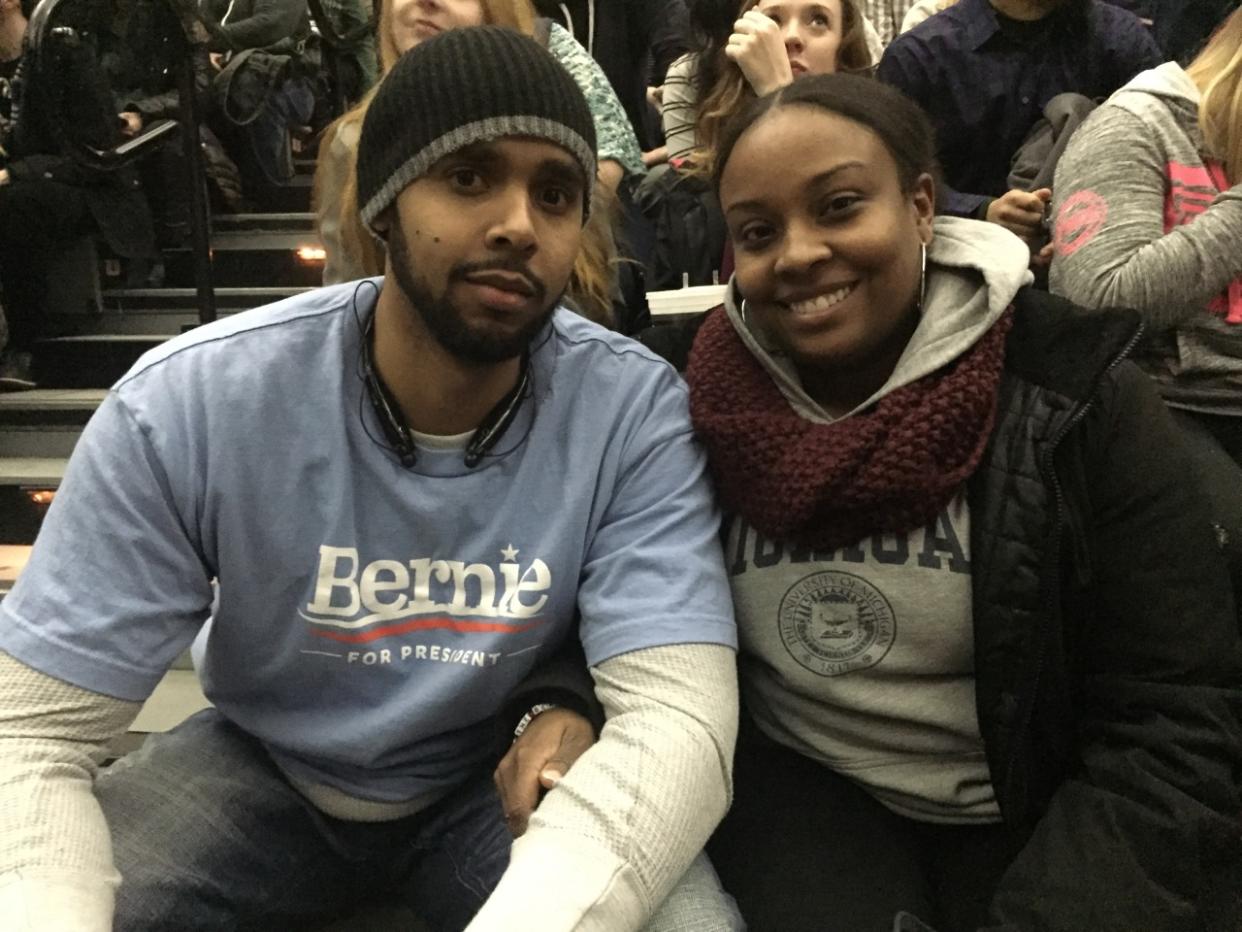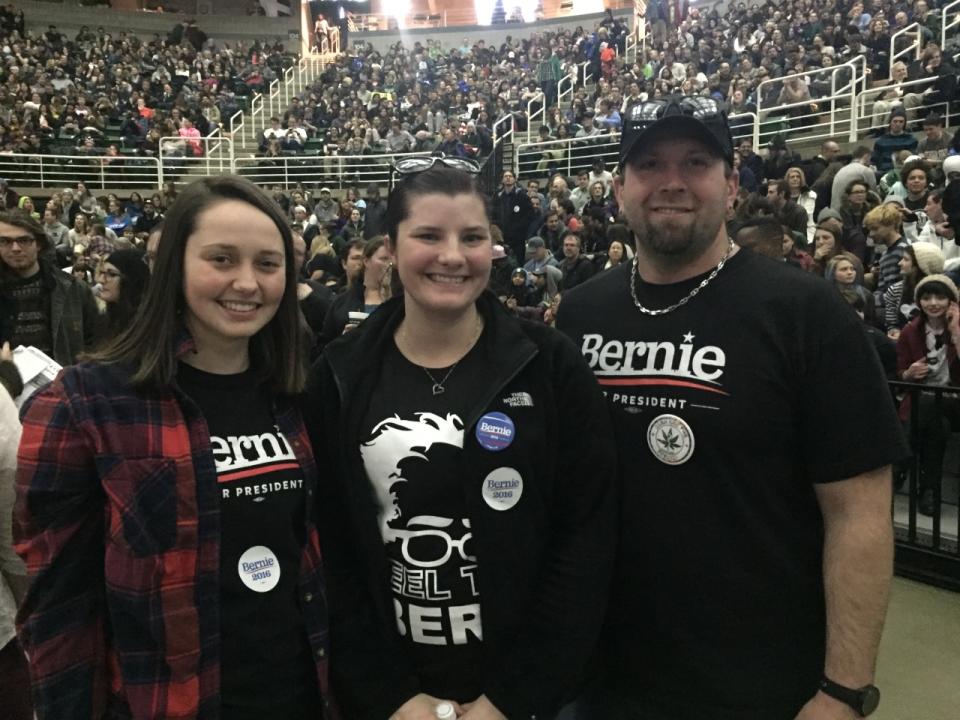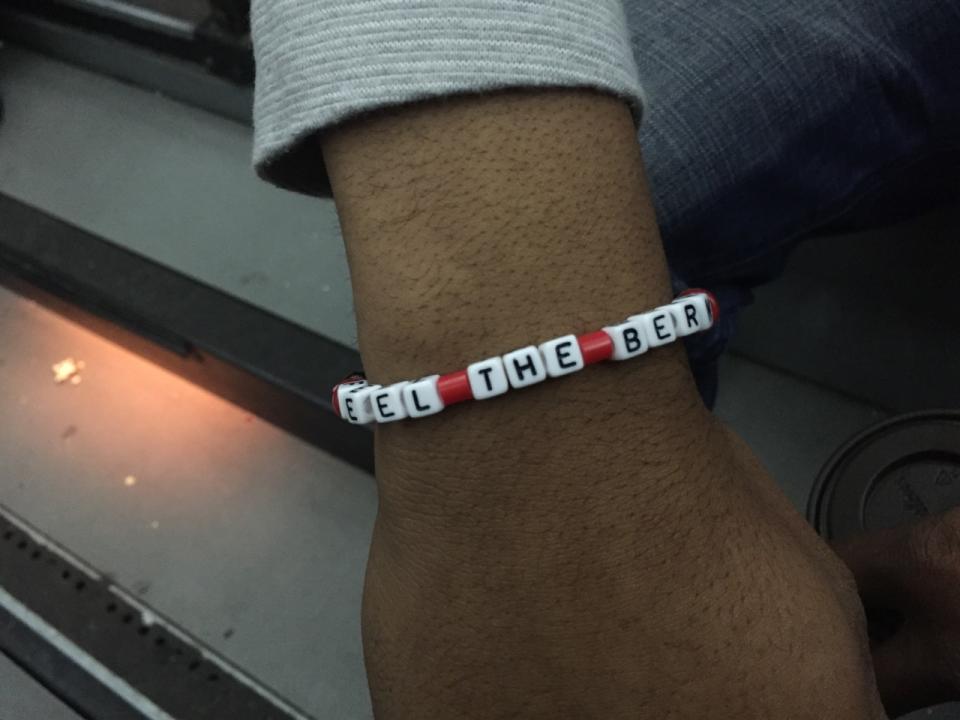Bernie Sanders kicks off post-Super Tuesday appeal to black voters in Michigan

Sanders supporters Walter and Brittany Stevenson of Canton, Mich., waited outside in the cold for three hours to get front-row seats to see their candidate’s speech in East Lansing, March 2, 2016. (Photo: Caitlin Dickson/Yahoo News)
EAST LANSING, Mich. — Bernie Sanders made an impassioned appeal to black voters at Michigan State University’s Breslin Center basketball stadium in East Lansing Wednesday evening.
“This campaign is listening to the African-American community,” the Democratic presidential candidate told a crowd of approximately 10,000 enthusiastic supporters in this college town just outside Detroit.
Sanders’ affirmation, which was followed by a statistic on incarceration rates among black males in the U.S., was one of many that signaled a not-so-subtle attempt by Sanders to ramp up his appeal to African-American voters after his major loss to Hillary Clinton on Super Tuesday.
Clinton nabbed 1,052 Democratic delegates during sweeping wins in five Southern states with large African-American populations — reigniting concerns about Sanders’ ability to attract black voters and prompting pundits to predict the coming demise of Sanders’ underdog campaign.
But the longtime Vermont senator defiantly vowed to keep campaigning, and made clear that he’s not ready to give up the Democratic nomination — or the black vote — without a fight.
It was a decision that no doubt delighted Sanders supporters, many of whom waited for hours in the biting Midwestern cold to show that they too are still feeling the Bern.
“We want to be part of the revolution,” said 34-year-old Amanda Billings. Billings and her husband, Nathan, both decked out in Bernie T-shirts and pins, drove an hour and a half from Hubbardston, Mich., for Wednesday’s rally. They stood outside for more than two hours and managed to secure a prime spot on the stadium floor.
“We want to see change,” said Billings, who handles workman’s compensation for a local insurance company. “We want to see smaller people’s voices count, not just people who have money they can throw around to make decisions.”

From left: Nicole Bowen, Amanda Billings, and Nathan Billings showed their support for Sanders in East Lansing, Mich., March 2, 2016. (Photo: Caitlin Dickson/Yahoo News)
With less a week left before the state’s Democratic primary, it makes sense why Sanders chose to launch his latest attempt to court black voters in Michigan, home of the city with the highest percentage of African-Americans in the country. On Wednesday, drivers in the Detroit area could hear film director Spike Lee endorse Sanders in a radio spot (the same ad, presumably, that aired in South Carolina ahead of that state’s primary last week).
Yet Sanders’ rally didn’t take place in Detroit, but in East Lansing, a college town where black people make up just 6.8 percent of the population. And while there were certainly a variety of minorities, including African-Americans, in attendance, the demographics of the crowd seemed to reflect East Lansing’s overwhelmingly white majority.
The throngs of dedicated fans hardly needed warming up — they rose to their feet in excitement on several occasions before the event started, only to find that the stray cheer or round of applause did not signal Sanders’ appearance.
Before he finally took the stage, Sanders was preceded by 20-year-old activist Ja’mal Green, who has helped organize recent protests against police violence and corruption in Chicago. Green touted Sanders’ involvement in the civil rights movement of the 1960s, and expressed confidence that Sanders would strive to bring justice to the families of victims of police brutality, rattling off now well-known names like Eric Garner and Sandra Bland.
Sanders himself didn’t delve too much into the issue of police brutality, simply noting the existence of institutional racism instead. He did, however, discuss the water contamination crisis in Flint, the poverty-stricken, majority black, Michigan city where he’ll debate Clinton this Sunday. Eliciting resounding applause from the crowd, Sanders reiterated his call for Michigan Gov. Rick Snyder to step down in response to the situation in Flint, saying “the dereliction of duty from the governor is so high that he should resign.”
What seemed to resonate more with this Michigan crowd than Sanders’ attempts to discuss issues of race, however, were his efforts to tie union rights, collective bargaining and domestic production — topics near and dear to many Michiganders’ hearts — into his regular talking points about wealth distribution and “disastrous trade policies” like NAFTA.
The crowd roared when Sanders talked about his proposals for universal health care and tuition-free college — the things that attracted Walter Stevenson and his wife, Brittany, two of Sanders’ African-American supporters, to his campaign in the first place.
After more than an hour’s drive from Canton to East Lansing, and close to three hours of waiting outside in the cold, the couple were seated on the first row of bleachers to the right of the stage, with a perfect view of the podium.
Walter, 29, showed off a bracelet he got from a woman outside in exchange for a donation that spelled “Feel the Bern” in beads.

Walter Stevenson shows off a “Feel the Bern” bracelet made by a fellow Sanders supporter at a rally for the Democratic presidential hopeful in East Lansing, Mich., on Wednesday. (Photo: Caitlin Dickson/Yahoo News)
Stevenson, who drives a truck, said he first became familiar with Sanders a few years ago from listening to progressive radio host Thom Hartmann’s syndicated talk show, which used to host a weekly segment with the Vermont senator called “Brunch with Bernie.”
A loyal Democrat, Stevenson said he was “all on board” for Hillary Clinton until Sanders entered the race.
“He’s the only [candidate] that kind of comes across as honest,” Stevenson said.
Brittany agreed.
“I feel like I can’t trust her,” said the 28-year-old social worker, pointing to Clinton’s changes of opinion on controversial issues like the Iraq war and same-sex marriage. “Now all of a sudden she’s become more left. … I don’t know if she’s going to do what she says she’s going do.”
“She wants to be in public office so bad she’ll say whatever she needs to,” Stevenson interjected. “I always tend to get uneasy when you have these families with too much political power.”
Despite the fact Sanders himself has been in Congress for 25 years, and was the mayor of Burlington, Vt., for 8 years before that, Stevenson said, “I don’t see him as an insider.”
In fact, the subject of Hillary Clinton seemed to unite Sanders’ supporters more than anything else. Just the mention of her name from the stage prompted loud, guttural boos that reverberated throughout the stadium — a more negative response than the one directed at Donald Trump. When asked individually about Clinton, many at the rally gave responses strikingly similar to the Stevensons.
“All she cares about is winning,” said 19-year-old Finn Kelly, arguing that Clinton has changed a lot of her opinions to sound more like Sanders. “She’s a follower, not a leader.”
“If in the primaries Bernie [doesn’t] win, I’ll have to vote for her,” Kelly added. “She’s better than Trump, but not much better.”
Aaron Gordon — a junior at MSU and among the smattering of young black voters in the audience — admitted that between studying for his mechanical engineering classes, his resident assistant duties, and his job in 3D printing services at the main library on campus, he hasn’t had much time to follow the election closely.
Still, the 20-year-old Detroit native seemed pretty sure about whom he plans to vote for in the Michigan primary next week.
Gordon said he disagrees with comments Donald Trump has made about Muslims and immigrants, and said he is looking for a candidate “who truly has an interest in all the people in the U.S.”
“Based on what I’ve been hearing, Bernie’s my pick,” he said.


